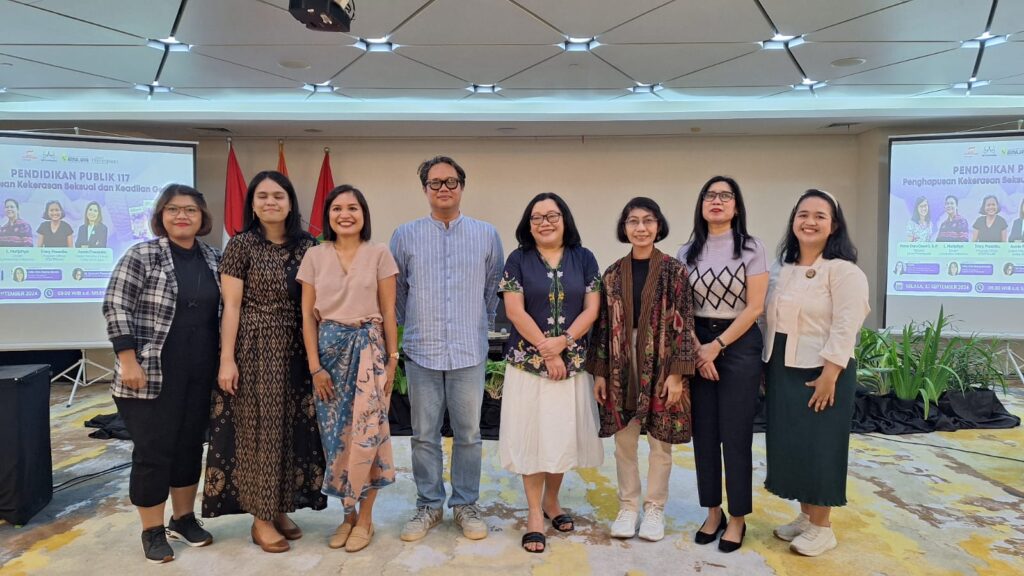The public education event organized by the Partnership together with the Women's Journal Foundation and Atma Jaya Catholic University, with the support of the Estungkara Program, became an important moment in the discussion regarding the issue of the elimination of sexual violence and gender justice.
The event took place on Tuesday, September 10, 2024, at the Yustinus Building of Atma Jaya Catholic University. With a crucial and relevant theme, the event invited the public to delve deeper into issues that are often difficult to express, especially among indigenous people.
This Public Education presented several speakers. Such as Retno Daru Dewi from the editorial team of Jurnal Perempuan, L Nurtjahyo, a lecturer from the University of Indonesia, Asmin Fransiska, Dean of the Faculty of Law, Atma Jaya Catholic University, and Tracy Pasaribu from the Partnership. In addition, M. Zamzam Fauzanafi, a researcher from LAURA UGM, was also present as a respondent. This event was also opened with a warm welcome from the Vice Chancellor for Innovation, Research, and Cooperation of Atma Jaya Catholic University, Yanti, and Abby Gina Boang Manalu, Executive Director of the Jurnal Perempuan Foundation.
One of the main points highlighted in this event was how difficult it is to discuss the issue of sexual violence within indigenous communities. This challenge arises from various cultural boundaries and values that are deeply embedded in indigenous communities. Based on research conducted by LAURA UGM and Kemitraan, in East Sumba and Mentawai, it was found that forms of sexual violence in indigenous communities have been categorized by indigenous elders and indigenous women themselves. They are able to distinguish between severe sexual violence, such as rape, and minor sexual violence. Although the handling of these cases is still very much tied to customary norms.
In Wanggameti Village, East Sumba, for example, severe sexual violence often occurs within the family. Both biological families and distant relatives. Village children who have to go to the city to continue their education often become victims of rape when living with relatives or friends.
In addition, in everyday life, girls who stay at home to help with household chores often face unequal power relations. Especially with the caste system in the East Sumba indigenous community, namely maramba and ata. The maramba group, which has a higher social status, is often the perpetrator of violence. Plus, it is difficult for victims to speak up because the perpetrators have power in society.
What is more interesting is that although the indigenous people of East Sumba have been able to recognize forms of sexual violence, the stigma and social barriers are still very strong, so that victims are reluctant to speak up. Meanwhile, in a study conducted in Malancan Village, Mentawai, it was found that cases of sexual violence have been included in village regulations (Perdes Malancan No. 1 of 2022). This shows that there is a more progressive legal awareness in the village. Although the main problem remains in the hierarchy of power and manipulation of customary law.
In the context of eliminating sexual violence, the discussion of “safe spaces” for victims is very important. However, according to Tracy Pasaribu, many do not understand the concept of safe spaces in depth. Safe spaces are not just physical places, but also spaces where power relations and activities occur without fear. In indigenous communities, places are often still interpreted physically. While sexual violence experienced by victims can be physical or emotional.
Safe spaces must be able to create a sense of comfort, where victims can speak without fear of stigma or social sanctions. A real example expressed in the discussion was how indigenous women in Wanggameti, East Sumba, dared to speak about their experiences. Although many did so in secret. They came to the researchers at night, or talked while working in the fields. Because that was the only space where they felt safe.
The concept of safe space must also be applied in official forums such as the Village Development Planning Deliberation (Musrenbangdes) and the Hamlet Development Planning Deliberation (Musrenbangdus). Unfortunately, these forums are often still dominated by perpetrators of violence or those with strong power relations. So that the victims feel intimidated.
Therefore, there needs to be an effort to create a discussion space that is truly safe and inclusive for indigenous women. One of the biggest challenges is changing existing social norms. So that indigenous women can more freely voice their experiences without fear.
This research provides a clear picture of the complexity of gender justice and sexual violence in indigenous communities, as well as the importance of supporting safe spaces for victims. With the involvement of various parties, including academics, researchers, and local communities, it is hoped that the issue of sexual violence can be addressed more comprehensively. So that indigenous women can have the courage to speak up and actively participate in the decision-making process in their communities.


